Part 50: The Fitna of Al Andalus
Chapter 18 – The Fitna of Al Andalus – 1670 to 1680The crisis that hit the Sultanate of al-Andalus in the late seventeenth century would quickly become one the defining periods in the history of the peninsula, which would bear its legacy for centuries to come, marking a clear divide between the Iberia of yesteryear and the Iberia of tomorrow.
The spark that initially set off the Fitna would not dominate the entire crisis, however. The civil war between Sultan Utman III and the Majlis al-Shura began as the central conflict, but it would quickly broaden in scale as everything from separatists rebellions to dynastic rivalries to foreign intervention came into play, with this entire myriad of conflicts coming together to form what is now known as the Fitna of al-Andalus.
At the dawn of 1670, however, nobody could have guessed what carnage and chaos would engulf Iberia by year’s end. The only developments of note during January was the outbreak of another war in the east, where the Vakhtani Caliph declared war on the Theocracy of Greece, anxious to put his defeat by Egypt behind him.

A few weeks later, Sultan Umar Almoravid passed away at the venerable age of 76, leaving the Moroccan empire to his eldest son Amray.

At much the same time, the foolish King Adhémre of France also died, having done nothing but drag his kingdom into more devastating wars. The nobles of France genuinely considered overthrowing the Italian Bo’ilas dynasty, but reconsidered when it turned out that the new king was something of a military genius.

King Dávi immediately put an end to the conflict with the German princes, and on fairly favourable terms, considering France had certainly been losing the war. He then turned his focus back to France itself, intent on rebuilding the army and developing his war-torn domains.

And to France’s south was Muslim Iberia, united under the authority of Al Andalus about two decades ago. Unrest had been bubbling for years now, however, and the first cracks began to show with the outbreak of an Aragonese rebellion just as summer broke.

This rebellion was very dangerous, especially since the bulk of Andalusi forces were still stationed across the Atlantic Ocean, under the command of Supreme Commander Ya'far Hisham. Even before Sultan Utman could do anything about it, however, his agents in the north informed him that the new king of France had been arming more rebels.

The Majlis immediately broke out into chaos, demanding immediate war with France, but Sultan Utman III stood firm and refused them. When the assembly tried to declare war anyways, the Sultan ordered the arrest of several high-profile merchants, only to flee the capital after his plot was foiled.
Utman managed to escape to Tulaytullah – the City of Sultans and a loyalist stronghold. Once there, he declared the Majlis to be illegitimate in the eyes of Allah, and vowed to raise an army to force its dissolution.
And this is where the Fitna of al-Andalus truly begins.

Sultan Utman had the unconditional support of a number of nobles and imams, and managed to raise a host formidable enough to be a threat, but not one that was undefeatable.

The Majlis was dominated by the powerful families of Al Andalus - the Yahaffids, the Bilalids, the Hammudids and the Abbadids. These dynasties quickly took control of Qadis and declared the young Ismail – Utman’s only son – to be the new Sultan of Al Andalus. Just as they began raising an army of their own, however, more bad news arrived from France.

Apparently, Andalusi spies in Paris managed to unearth evidence that King Dávi was in contact with Sultan Utman, and he’d begun planning a war against the Majlis. This would be disastrous, of course, as the Majlis could not stave off two attacks at one, especially without allies.
It was not from France where the first blow came, however.
As Iberia slipped into civil war, the Celtic High King could think of no better opportunity to pounce on his colonial rival, declaring war on Al Andalus and all its Gharbian holdings.

The foes arrayed against the Majlis were quickly becoming insurmountable; they needed a professional force loyal to the assembly if they were going to prevail. So the merchants and nobles turned to Ya’far Hisham – the man who had almost complete control of the Andalusi armies.
This began a short but dangerous game of wits, where both the Majlis and the Sultan courted the Supreme Commander, knowing full well that whoever had the standing army also had a critical advantage. And when Utman offered Ya’far an entire emirate for his allegiance, the Majlis were forced into offering something far more valuable...

Ya’far Hisham – a lowborn general of mixed ancestry – was thus invited to not only join the Majlis al-Shura, but also serve as its de facto leader. Ya’far was quick to accept, and the Majlis sent the recently-rebuilt war fleet to escort him and his army back to Iberia.
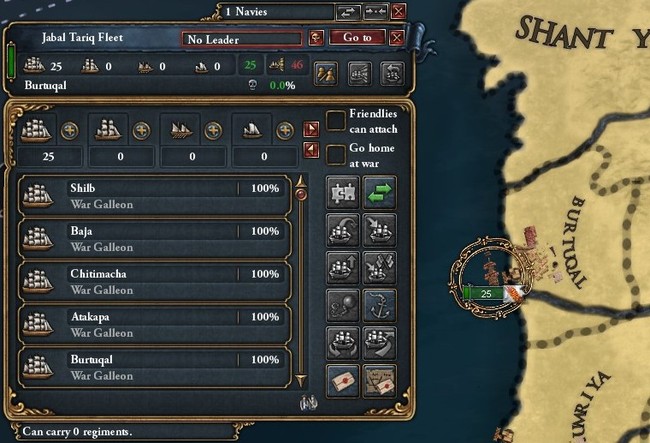
And once he reached Qadis, Ya’far was declared the Grand Vizier of Al Andalus, reviving an ancient but powerful title that hadn’t been used in centuries. And with the so-called 'sultan' Ismail still a mere child, this meant Ya’far had considerable power in his grasp, with his only rivals being the old guard aristocrats in the Majlis.

Once the Majlis had officially acclaimed him as the Grand Vizier, Ya’far left Qadis to begin the first Majlisi campaign. The Majlisi faction would have to fight Utmanic forces on the field of battle, of course, but both of these enemies were also facing the rebels and Celtic armies, only further confusing the matter.
Before butting heads with Sultan Utman, Ya’far decided to deal with the Aragonese separatists first.
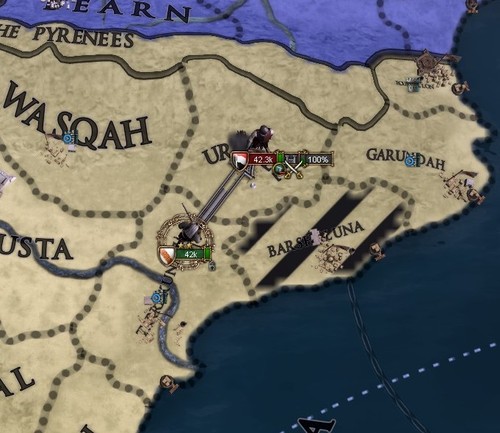
Determined to crush the Aragonese revolt before it could spread into the mountains, Ya’far appointed his own son as the new Supreme Commander of Andalusi forces, and young Salma Hisham showed his father’s ingenuity as the rebels were quickly routed and chased off the field.
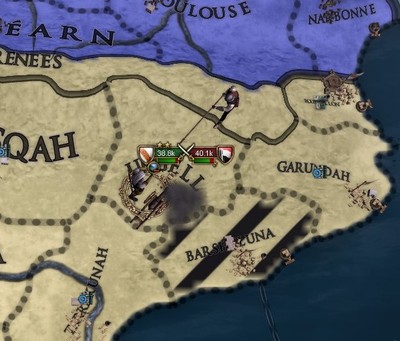
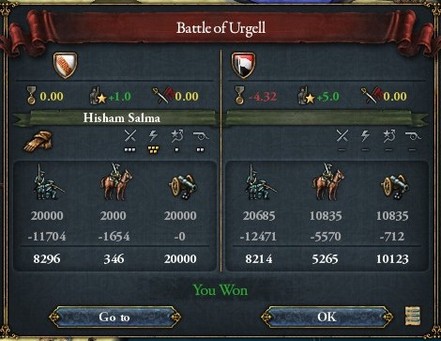
Meanwhile, the Majlis sent the Andalusi Fleet northward. Any chances of defeating both Utman’s insurrection and the Celtic Empire (including its allies and colonies in the new world) were nigh on impossible. So instead, the Majlis decided to try and blockade Ireland, trapping the Celts on their isle until Utman was defeated.
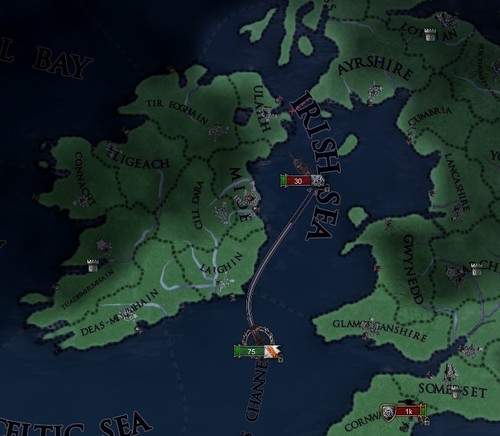
The two naval rivals clashed in the Irish Sea, with the numerically-superior Andalusi Fleet quickly overcoming the Celtic Navy and forcing it to retreat back to harbour.
Whilst fighting the Celts, however, the Andalusi also discovered that the enemy had far more capital ships than they did. So rather than linger, the Andalusi Fleet abandoned prior plans and fell back to safer waters.
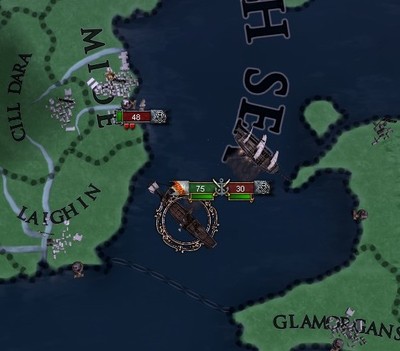
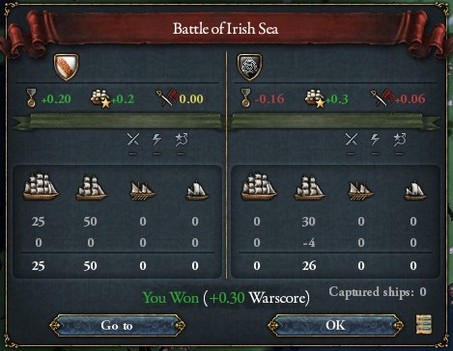
Meanwhile, back on the Iberian peninsula, Ya’far Hisham used government funds to hire foreign mercenaries, hoping to amass a force that was at least equal to Utman’s army.
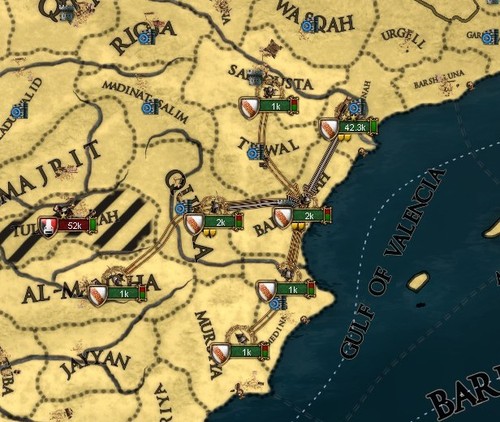
And before long, he’d managed to put together a force amounting to almost 55,000 soldiers, the majority of which were Andalusi levies. Commanding from a safe distance, Ya’far sent the army westward to intercept Utman’s force before it could reach the capital.
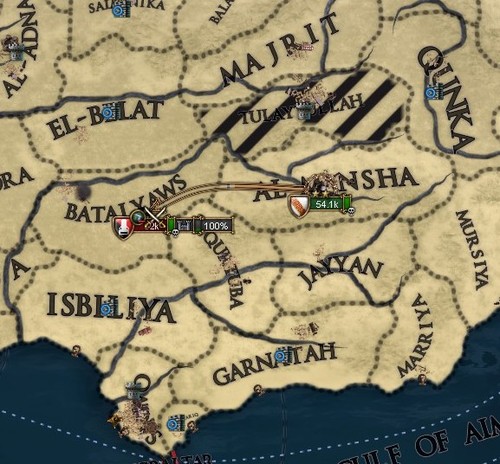
The first battle between Majlisi and Utmani armies thus broke out towards the end of 1672, with the armies roughly on par with one another. Utman was personally leading his forces, but Salma Hisham proved himself a far more inventive commander, using a series of tactical withdrawals and feigned retreats to trick the enemy into breaking rank, only to wheel around and crush their flanks.
The day ended with a decisive Majlisi victory, though Utman managed to escape with several thousand men when the battle began turn, fleeing towards his northern strongholds.
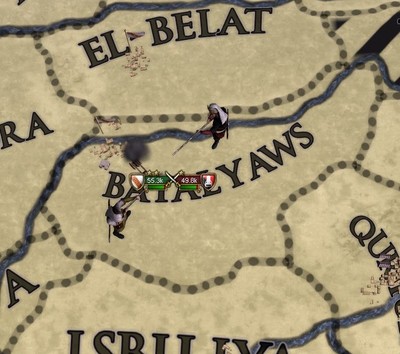
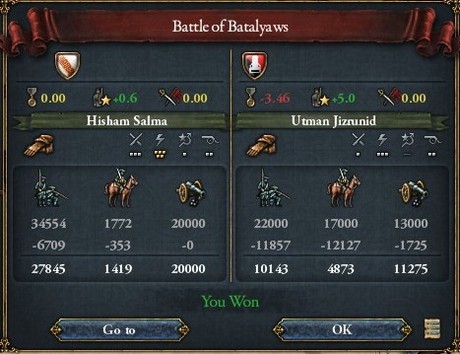
Just as news of the victory arrived in Qadis, however, riders also arrived from the fortress of Roussillon. Apparently, a French army had descended from the north and began blowing at its walls, determined to capture the strategic city before Andalusi relief forces could arrive.
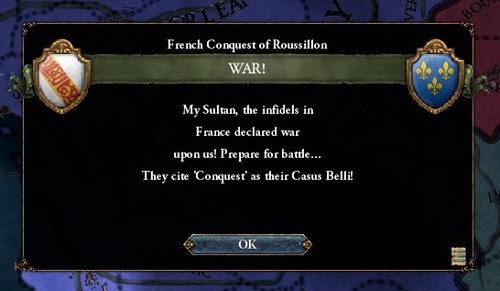
This was followed by more bad news, this time on the home front. After his crushing defeat, Utman had managed to escape back to Tulaytullah, where he somehow managed to convince the Banu Musa and Ghizvanni families to raise their banners and join his cause.
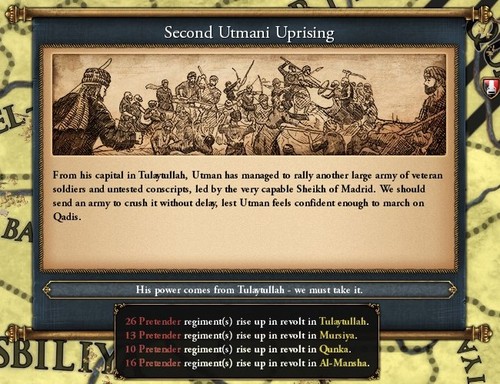
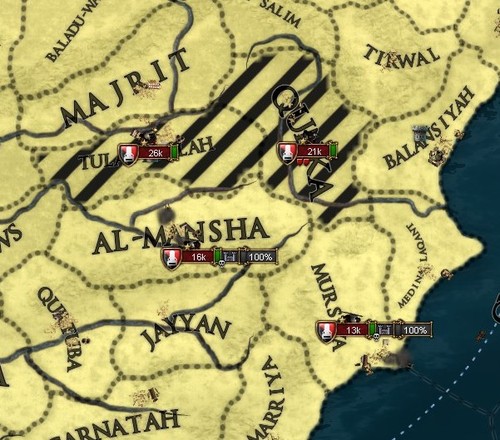
The Majlis – who were barely clinging onto support in southern Iberia – was now faced with foes in literally every direction. Not only were they fighting a massive civil war on home territory, but the two continental behemoths of France and the Celtic Empire were also looming down on them.
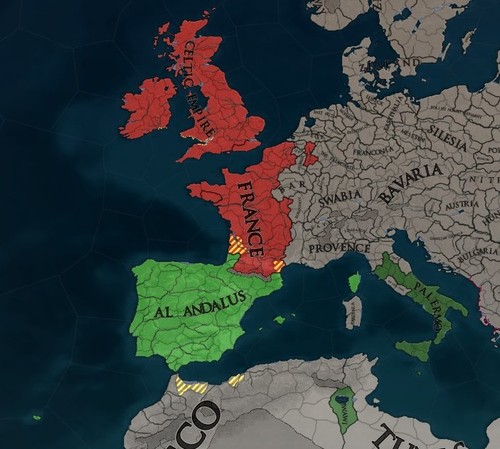
And to add to that, half of Gharbia had also erupted into war as its overlords clashed in Europe, with Andalusi colonies similarly surrounded on all fronts.
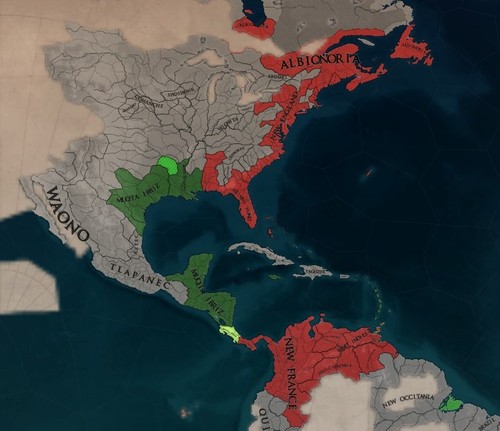
In fact, a combined English-Celtic army had already launched an invasion of Andalusia’s northern holdings, with their numbers dwarfing that of the colonial army.
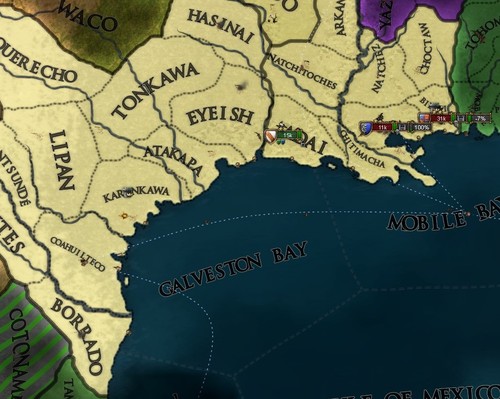
If the Majlis was somehow going to prevail, then drastic action would have to be taken. So Grand Vizier Ya’far forced the assembly to pass several drastic bills, placing almost absolute power in his hands. Not only did he now have the sole authority to appoint generals, but the Grand Vizier also awarded himself with a powerful veto on any Majlisi proposals, with the promise of more draconian reforms to follow.
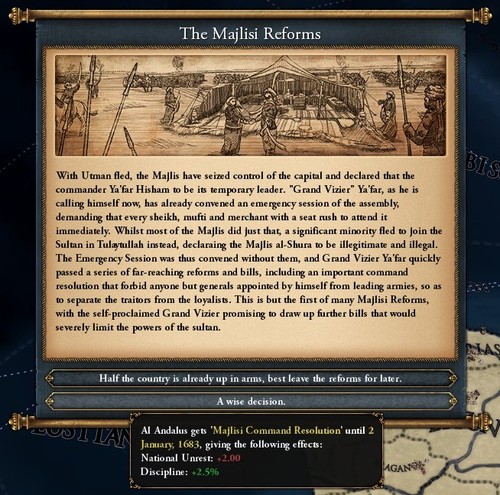
These reforms did have the benefit of centralising the Majlis’ power around a single person, and though it wasn’t good to give the Grand Vizier such powers in the long-term, it did allow Ya’far to pass laws substantially increasing the size of the levy armies.
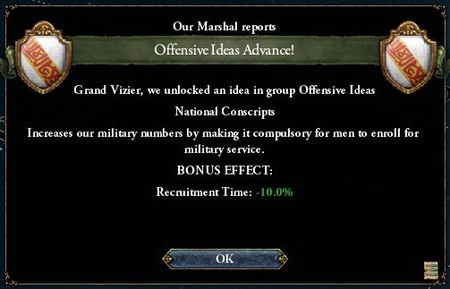
And with that, by the time the winter months came to an end, Ya’far Hisham had managed to seize absolute power in Qadis. He marched south to engage the starved and shattered remnants of an Utmani army in early May, wiping it out in its entirety after a short engagement.
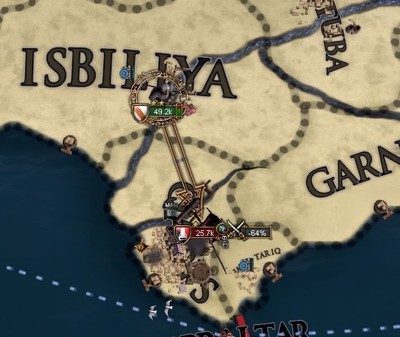
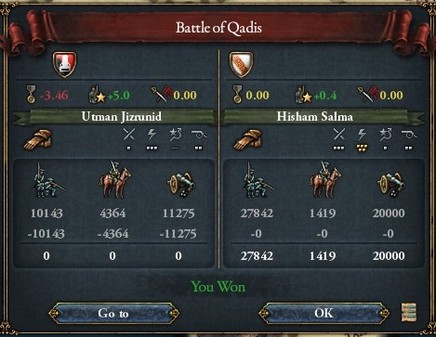
Even before he could begin to consider how to best tackle the Utmani armies amassing around Tulaytullah, however, Grand Vizier Ya’far was hit with another setback as the Sultan somehow managed to convince the Castilian princes to join his side.
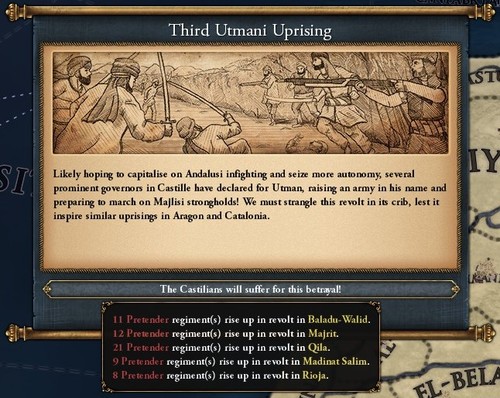
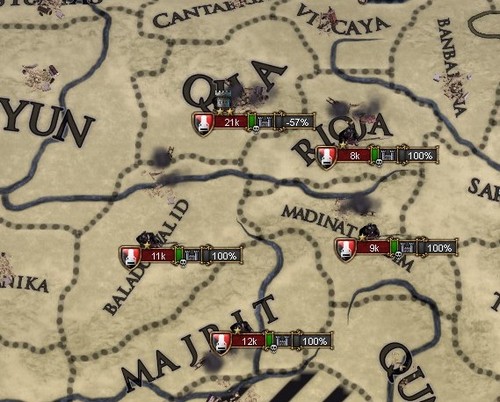
As though that weren’t enough, a few days later Ya’far received news of riots breaking out in several Majlisi strongholds, including Qadis. The agitated peasantry rose up in an attempt to overthrow their governors, burning half their city to the ground before the insurrection could be quashed.
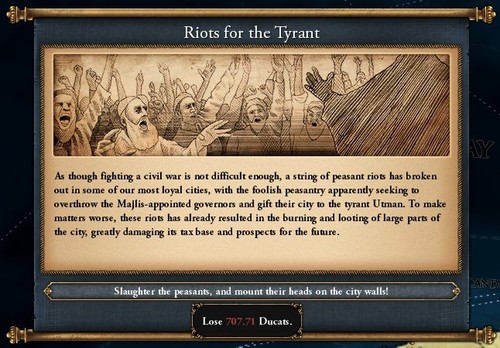
The treasury had already been stretched thin, and these riots were the final blow, with the Majlis forced to take out massive loans just to keep the army paid and navy raised.
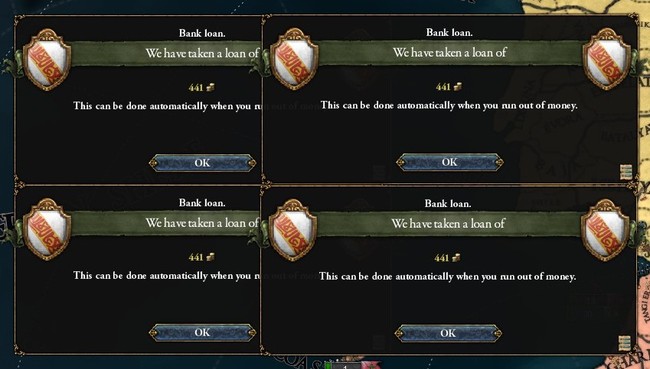
Desperate for some good news – any good news – Ya’far sent his son north with the army just weeks later, engaging a large Utmani army near the neutral city of Batalyaws - domain of the Aftasid dynasty. The rebel force was large and well-supplied, but Salma managed to outflank them whilst inflicting devastating damage to their centre, quickly surrounding the army and crushing its remnants, with thousands dead and thousands more surrendered.
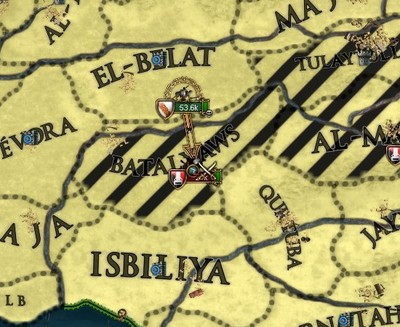
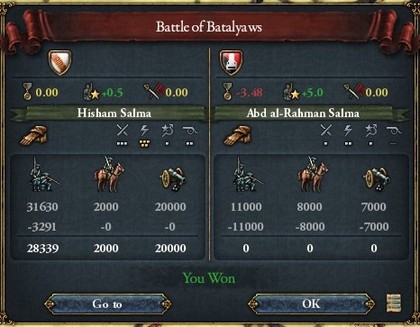
Salma Hisham then embarked on an offensive towards Iberia’s eastern coast, pushing his conscripted levies on a hard forced march, hoping to engage the two Utmani armies in separate battles before they could combine into a more dangerous force.
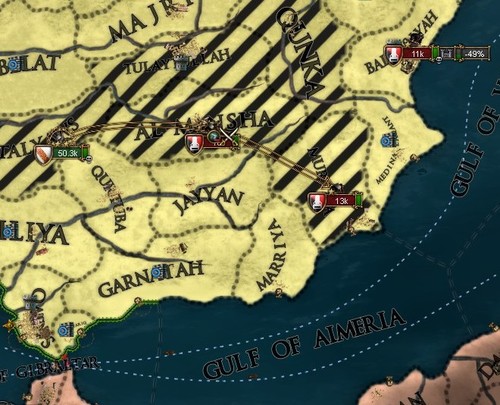
His campaign was a resounding success, with the enemy armies pinned down and crushed before they knew what had happened, wiped out to a man.
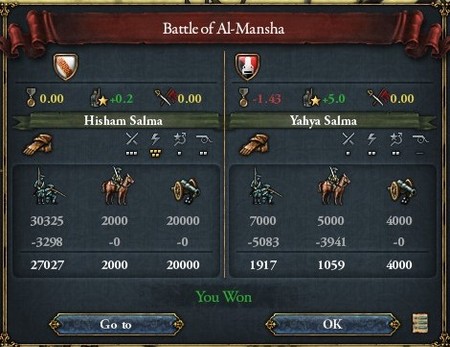
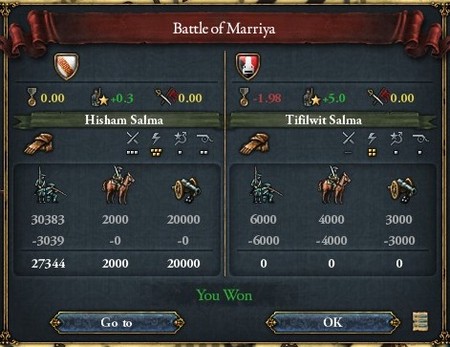
As had become usual, however, this success was tempered with another reversal. In the north, the French had finally managed to breach the walls of Roussillon, pouring into the city and slaughtering its garrison.
Once the strategic fortress was secured, they push south on another offensive, this time towards Barcelona.
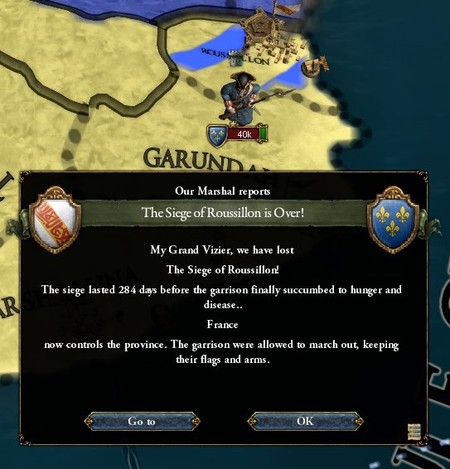
The only reconciliation came in the defeat of the French navy, which had been forced to withdraw from Iberian waters after a short battle along the Cote D’Argent.
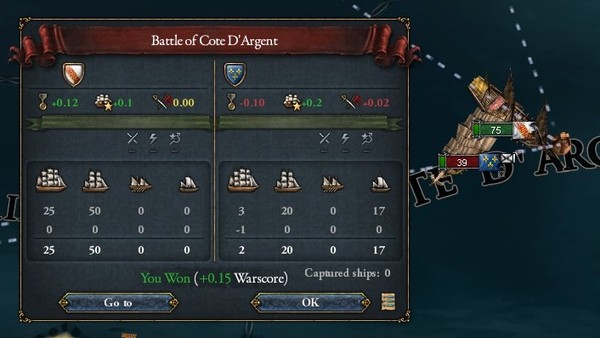
As the Fitna began to turn against the Majlis, the war in the east had also taken a turn against the dominant Muslim power, the Vakhtani Caliphate. The Armenian empire had invaded Greece and scored several early victories, but the Balkans once again joined forces against the Caliphate, and this time managed to push Muslim forces back across the Aegean.
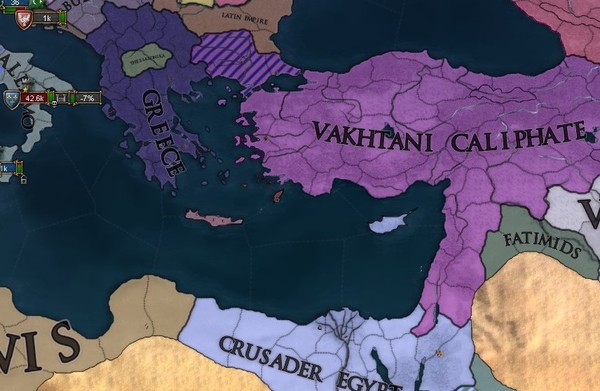
Islam was also on the retreat further south, with Crusader Egypt embarking on another attempt to secure dominance in the Hejaz, leaving the Sharifate of Mecca reeling after a number of defeats and rebellions.
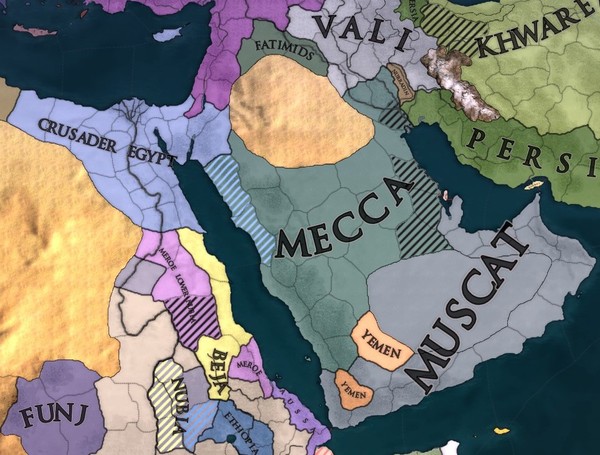
Back to the world-spanning war in the west, however, Andalusi forces were on the retreat in Gharbia. With the colonial army wiped out, there was no hope of somehow winning the war in both the old world and the new, so Ya’far Hisham withdrew his remaining forces and left the English and Celts to swarm across northern Gharbia.
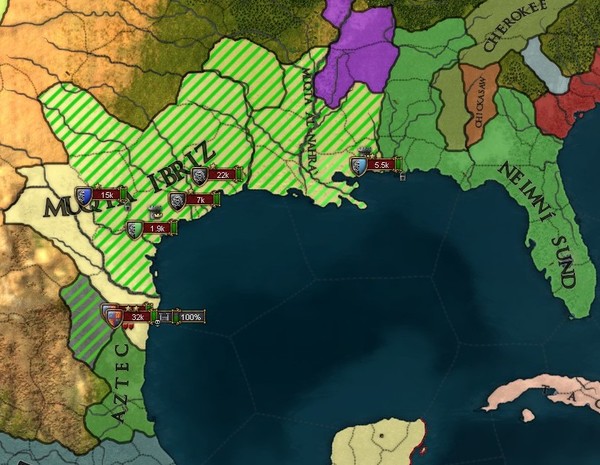
Instead, Ya’far took out another loan and raised a mercenary force further south, in the Yucatan Peninsula. With a new colonial force numbering 14,000 peasants, Ya’far hoped to throw back French colonial armies and secure dominance in Ibriz, at the very least.
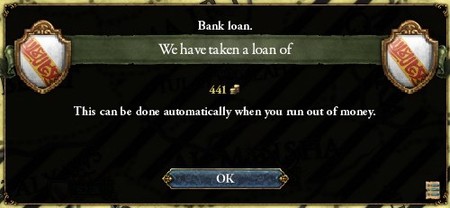
No such luck. Despite numerically-inferior numbers, the New French army somehow managed to rout the mercenary force, inflicting twice as many losses as their own and throwing the Andalusi force northward.
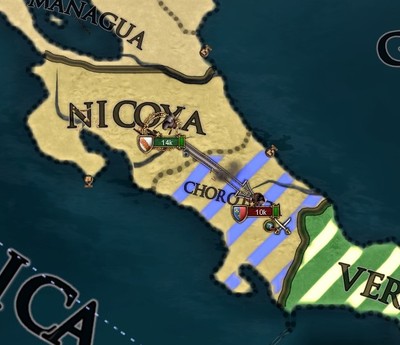
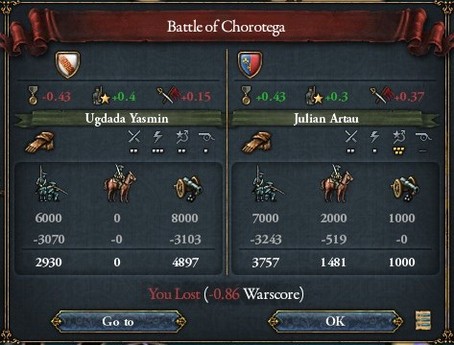
Ya’far Hisham grew increasingly enraged as the war in Gharbia turned further against him, but his attention was quickly drawn back to Iberia, where the Fitna was quickly spiraling out of control…
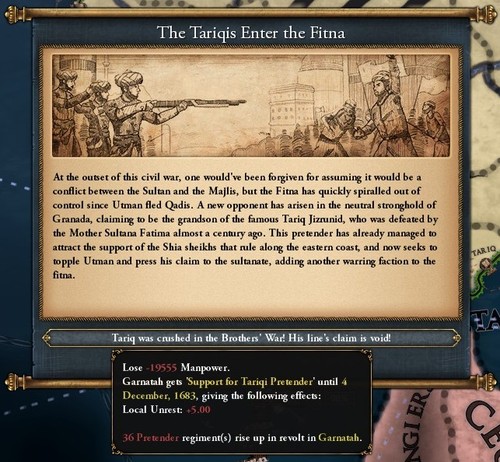
Apparently, the grandson of Tariq Jizrunid – a pretender who had revolted against Sultan Husayn almost a century past – had managed to rouse support for his claim amongst the Shia sheikhs of eastern Andalusia.
Known alternatively as both al-Mundir and al-Muhsin, this new pretender managed to rally almost 40,000 loyalists behind him, presenting yet another facet to the Fitna of al-Andalus.
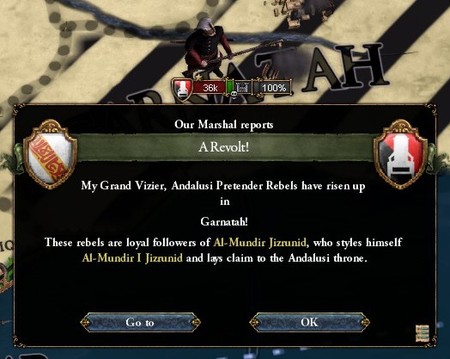
Almost two-thirds of Iberia was now under enemy occupation, so Grand Vizier Ya’far had to do something. He began a new campaign by sending his son northward, choosing to deal with Sultan Utman first.
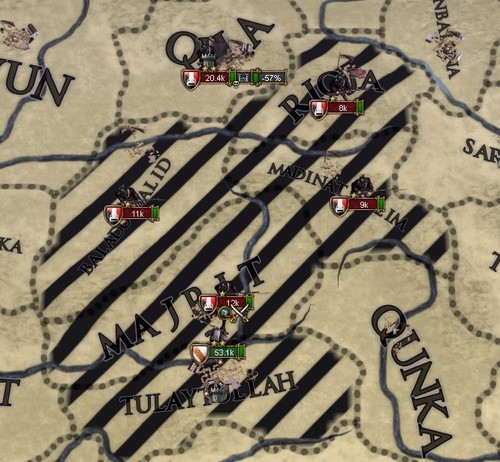
Determined to punish the Castilian princes for betraying the Majlis, the Grand Vizier instructed Salma Hisham to wipe out their forces without delay, giving him free reign to sack any cities he captured.
And the commander did just that, embarking on a stunning campaign towards the end of 1675, in which he managed to isolate and utterly crush the Castilian threat in four separate engagements.
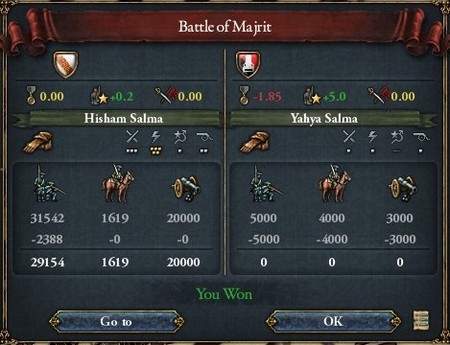
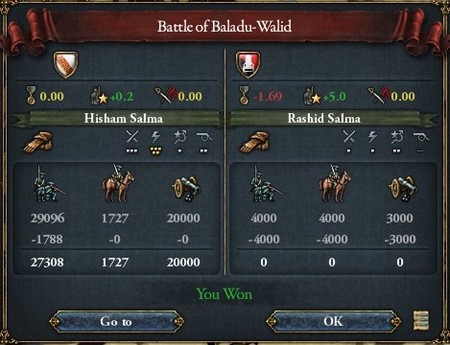
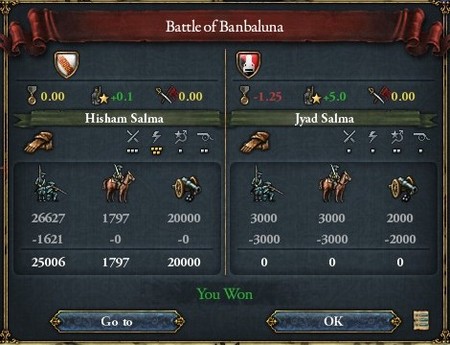
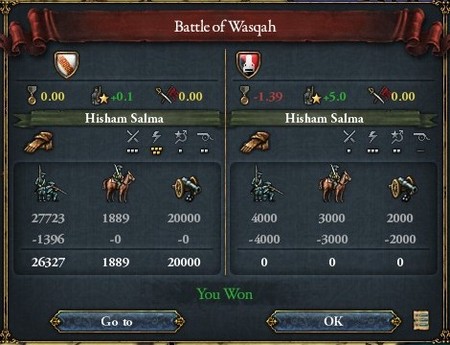
Once the smaller armies had been wiped out, Salma advanced on the Castilian capital of Qila, where the last and largest of Utman’s Castilian supporters had retreated.
The prince of Qila surrendered and sued for peace, but Salma Hisham refused him, forcing his army into a battle that ended in more of a slaughter. The commander then pushed on to Qila, giving leave for his men to ravage and ransack the city for almost a week.
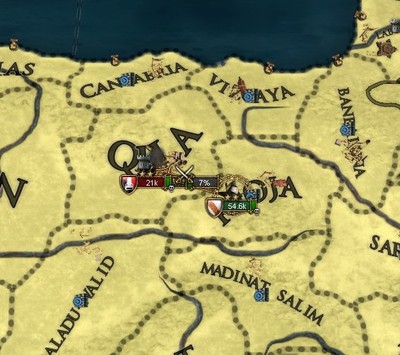
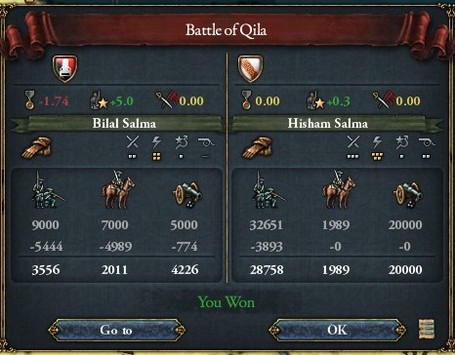
Utman himself was not there, however. He had evidently predicted the Castilian defeat, so the sultan fled again to the last of his loyalist strongholds: Balansiyyah.
As commanded by his father, Salma Hisham pursued Utman eastward, quickly engaging the pitiful bands of peasant-soldiers that he managed to raise.
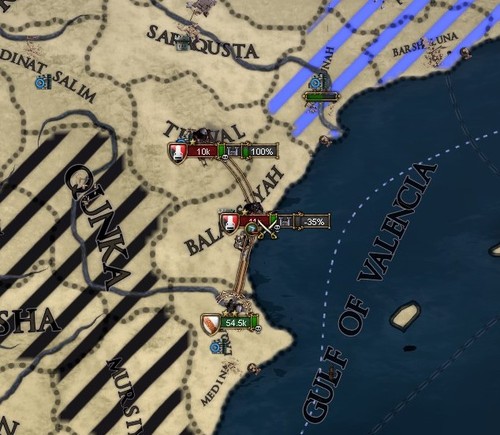
The armies were dwarfed by the well-supplied and battle-hardened Majlisi army, and were cut down without mercy. Once the battles were fought and won, Salma sent parties to scour the battlefield and find Utman, but the Sultan had somehow managed to escape yet again, this time boarding a ship in the Valencia docks and sailing for Palermo.
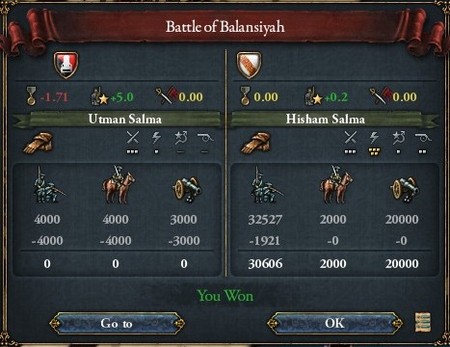
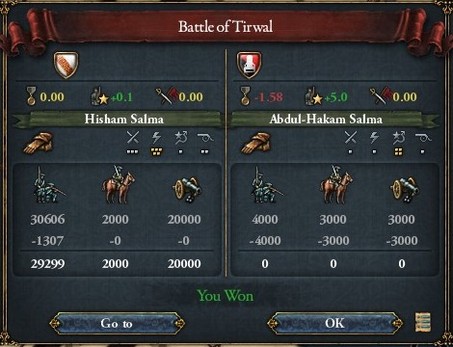
Grand Vizier Ya’far didn’t have the men to spare for a chase across the Mediterranean, so he left Utman to escape to his cousins in the east, allegedly vilifying him the “Sultan who Sailed.”
Instead, his focus was quickly drawn back to Iberia. Stewing after the brutal rape of their city, the peasants and princes of Qila rose up in another massive revolt, this time armed with French guns.
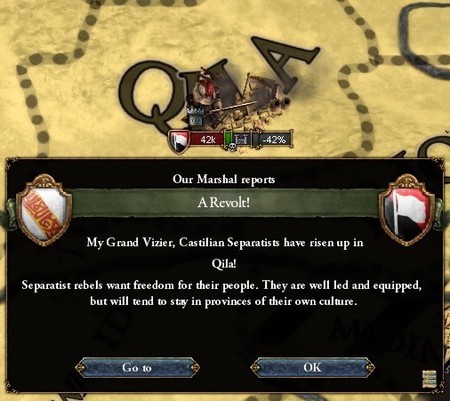
This was almost immediately followed by a similar revolt in Porto. The Portuguese had not yet declared for one side or the other, and instead decided to simply take matters into their own hand, led by a local Catholic prince.
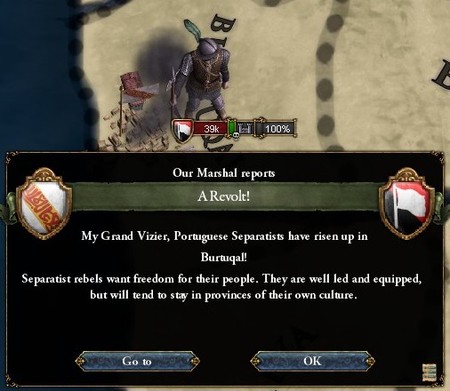
The separatist revolts had to be dealt with eventually, as would the Tariqi pretender in Granada, but the greatest threat currently posed to the Majlis had to be the French. They’d already managed to capture Roussillon and Barcelona, and now lay siege to Labourd, which would give them complete control over the Pyrenees and northeastern Iberia.
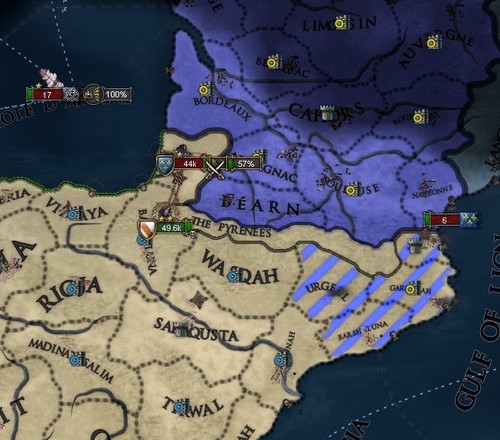
So the Grand Vizier sent commander Salma Hisham to throw back the French army and provide some relief to the beleaguered peninsula. Salma had gone through the entire Fitna undefeated, earning him considerable fame and acclaim, but the general had never faced a French tactician before.
And as he would quickly learn, the French would not be so easily defeated. Salma tried to outflank them with his numerically-superior forces, only for his own flanks to come under devastating barrage, forcing the Andalusi to cave in and fall back in disarray.
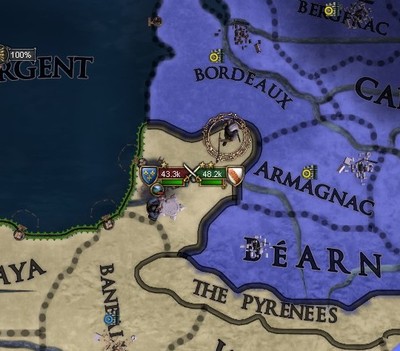
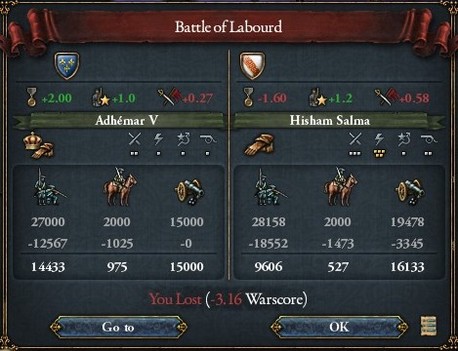
Having scored a decisive victory, the French immediately turned their guns back to Labourd, reducing its walls to rubble in the space of hours. The morale-shattered garrison quickly surrendered after that, handing another victory to the euphoric French.
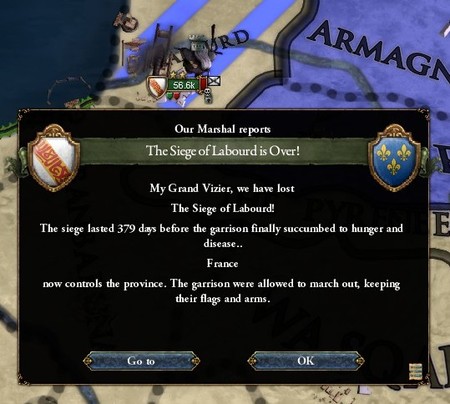
Back in Qadis, Grand Vizier Ya’far barely had the time to curse before he was thrust with another crisis. Apparently, his agents had discovered that al-Muhsin – the Tariqi pretender – was making advances on Galind Aftasid of Batalyaws, a powerful emir who had remained neutral so far.
The Majlis urged Ya’far to intervene and lure the Emir onto their side instead, but the treasury was empty and the sultanate was already thousands of dinars in debt, so nothing could be done but leave Emir Galind to declare for al-Muhsin.
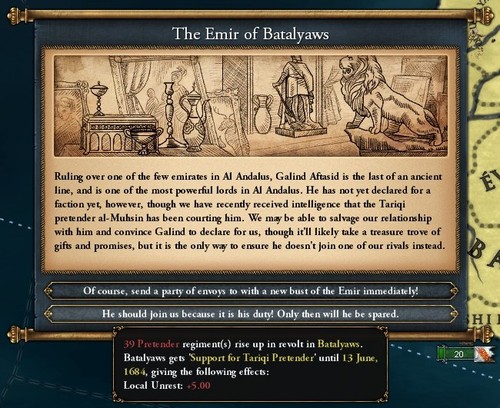
Meanwhile, across the Atlantic Ocean, the Celts had managed to secure their hold on northern Gharbia without much opposition.
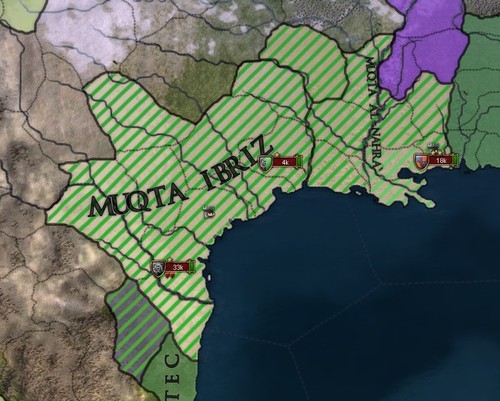
They had also landed massive armies in Andalusia’s Caribbean holdings, quickly bringing the vast plantations and immense harbours of Juzur Qarbiya under their control.
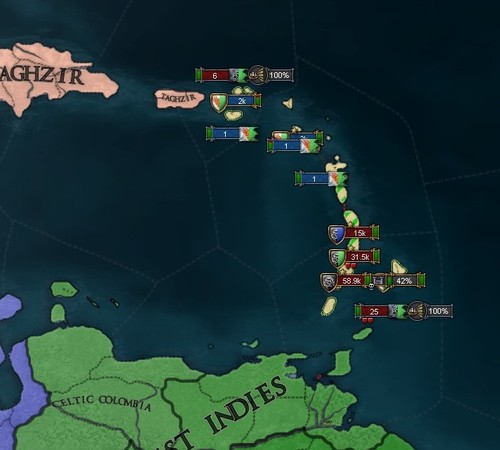
These were all serious blows to the Majlis, of course, but it did finally impel Ya’far to use his navy once again. If the Celtic forces could be trapped in the Caribbean, another colonial army could be raised to try and retake northern Gharbia, providing some measure of relief.
So the Andalusi Fleet set out westwards towards the end of 1677, sailing through the stormy winter seas to pin down a smaller Celtic fleet in the Lusitanian Sea, where it was quickly defeated and forced to flee.
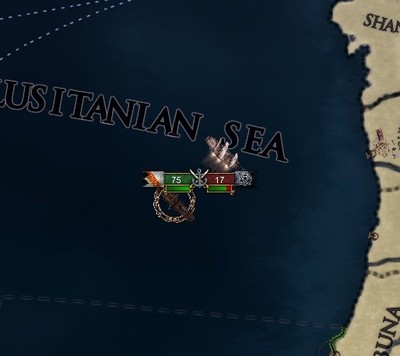
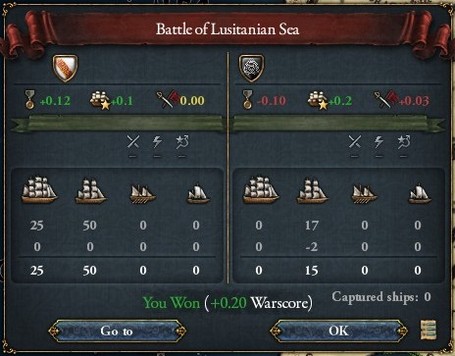
The fleet then pressed on into oceanic waters, only to be faced with another Celtic fleet – this one significantly larger. Still, the Andalusi Fleet had more capital ships amongst their ranks, so they pushed onward to engage the enemy.
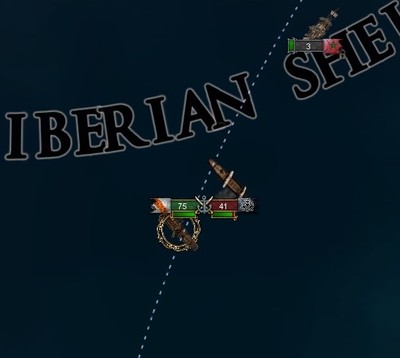
That battle didn’t exactly… go to plan, however. Despite having more warships, the Celts were able to outmaneuver some of Andalusia’s biggest vessels, rendering them useless as Celtic galleons blew them to smithereens.
Thus, by the time the Andalusi Fleet managed to break away from the battle, it had sustained massive losses, with nineteen war galleons sunk to the darkest depths of the ocean. If it was in doubt before that day, then that crushing defeat had certainly destroyed any remaining illusion of Andalusi control of the seas.
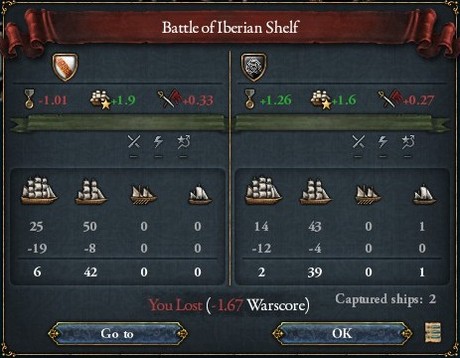
Faced with increasingly daunting prospects, Grand Vizier Ya’far commanded his son to march on the Castilian rebels, who were on the verge of overwhelming the loyal Andalusi garrison.
Salma’s perceived invulnerability may have been shattered at the battle of Labourd, but he was still a capable and resourceful general, and quickly managed to quell the Castilian uprising.
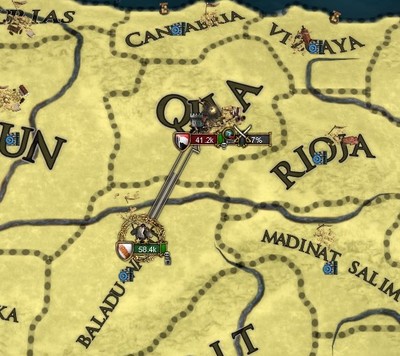
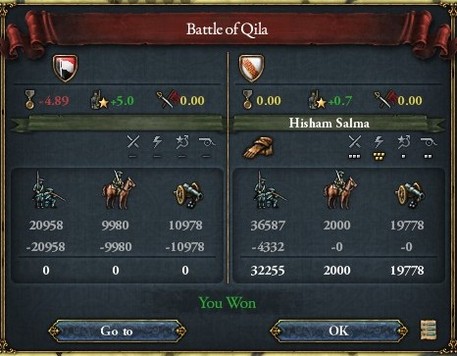
Even before Salma Hisham could push south to end the revolt, bad news arrived. Al-Muhsin, the Tariqi pretender to the throne of Al Andalus, had personally led a large force to besiege Qadis - putting the Grand Vizier himself at risk.
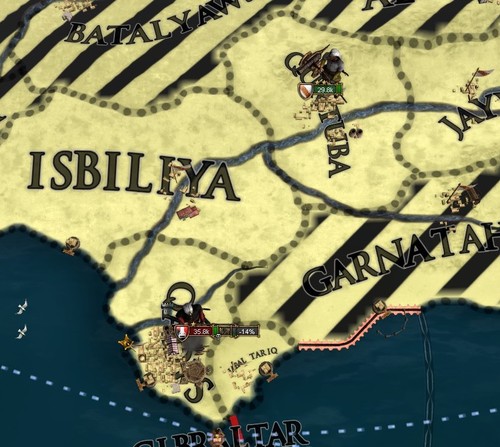
Salma Hisham was forced to take out even more loans, raising more mercenaries until they made up a full two-thirds of his army. Once he felt confident enough in his numbers, he marched south with haste, engaging the Tariqi rebels from the north whilst a sortie erupted from the south, handily defeating the surrounded force.
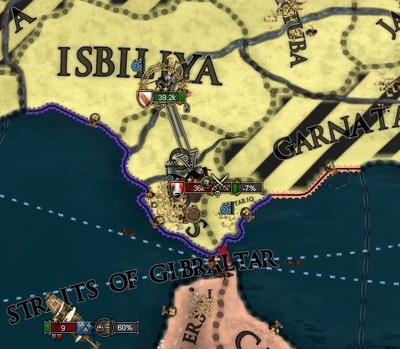
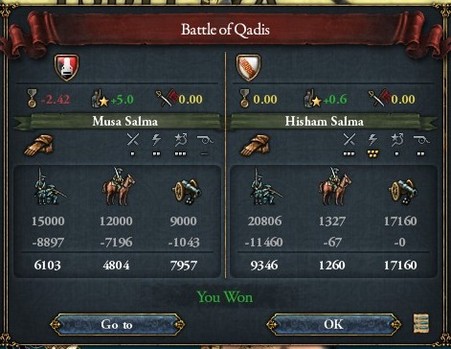
Just as Qadis was relieved, however, the fortress of Saraqusta capitulated. The French now had control over all of northeastern Iberia, paving the way towards Balansiyyah and Tulaytullah.
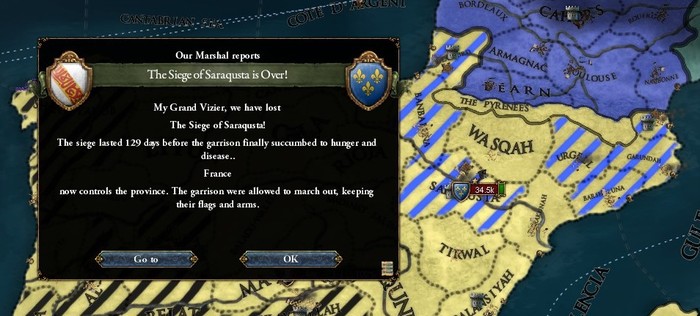
As Majlisi forces prepared to push north and finally face down the French, however, tragedy struck.
Whilst inspecting an elite division of the Andalusi army, a soldier leapt out from the ranks and fired straight at Grand Vizier Ya’far, blowing a hole in his forehead and killing him instantly. The assassin was quickly pinned down, but chaos erupted throughout Qadis, with one of Yafar’s generals naming himself as the new Grand Vizier.
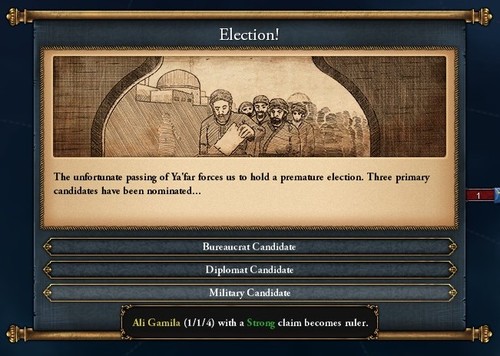
Salma Hisham angrily denied Ali Gamila’s declaration, claiming that he had been Yafar’s closest and most trusted general, not to mention his son, making him his rightful successor. All of this broke out into a violent power struggle, with the Majlisi army breaking down into warring factions.
Meanwhile, the Andalusi Fleet had pushed westward in an attempt to relieve Andalusi troops still trapped in Ibriz, only for it to be pinned down by another Celtic fleet. The battle could only end in one way, with the Andalusi Fleet utterly crushed.
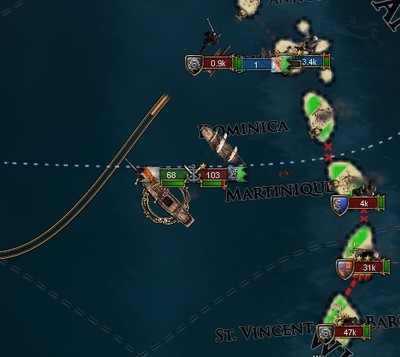
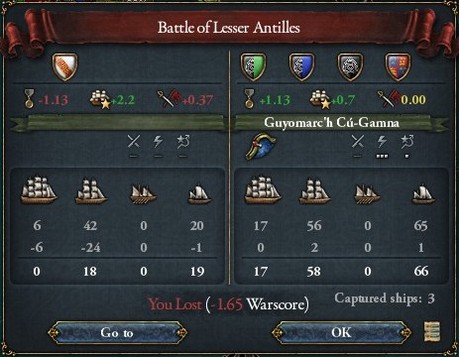
It was only then, with the High King hearing of the internal crisis overwhelming Iberia, that the Celtic Empire finally sued for peace.
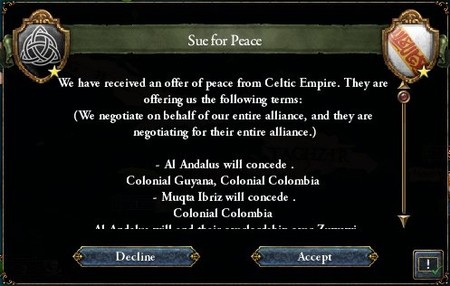
Their demands were harsh, but the Majlis had no choice but to accept them, ceding vast stretches of land in Gharbia to the High King, along with a small fortune in gold.
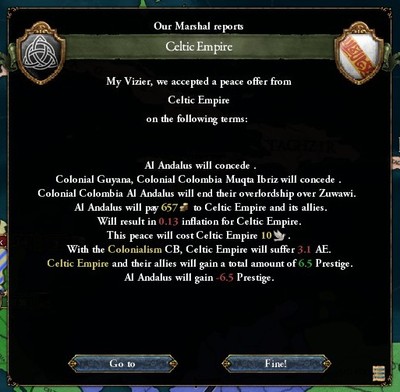
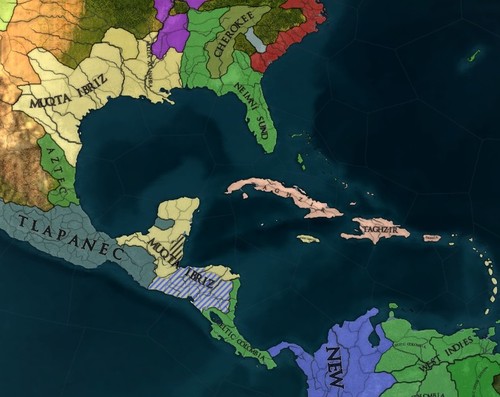
And of course, not even a week passed before Juzur Qarbiya began pining for autonomy again. Furious at having been repeatedly occupied and pillaged during the Celtic War, the Muqti entered into an illegal alliance with Sultan Amray of Morocco, making war with Al Andalus inevitable.
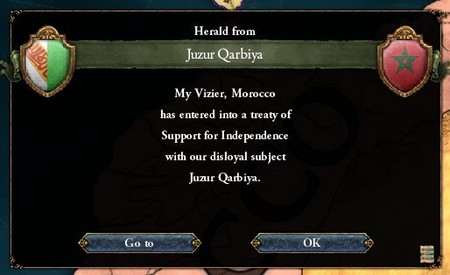
Meanwhile, the eastern empire of the Vakhtanis was similarly embroiled in turmoil. The Vakhtani Caliph was struck a disastrous blow at the battle of Edirne, forcing him to sue for peace with the Balkan League, ceding large tracts of land to both Greece and the Latin Empire.
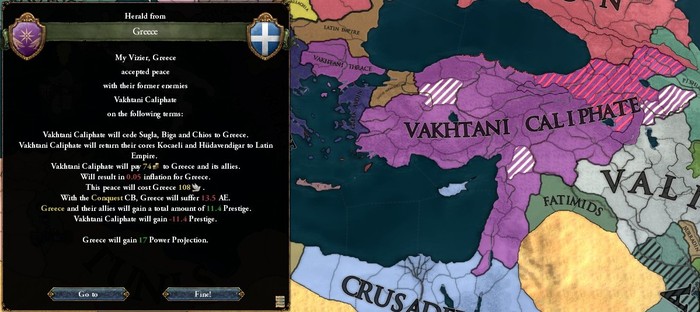
Back in Iberia, meanwhile, the power struggle between Salma Hisham and Ali Gamila was still raging. Large stretches of Iberia was still under occupation, however, and unless the Majlis intervened the entire sultanate would fracture into a dozen feuding states.
So they named Salma Hisham the new Grand Vizier of Al Andalus, ordering the immediate imprisonment and execution of Gamila.
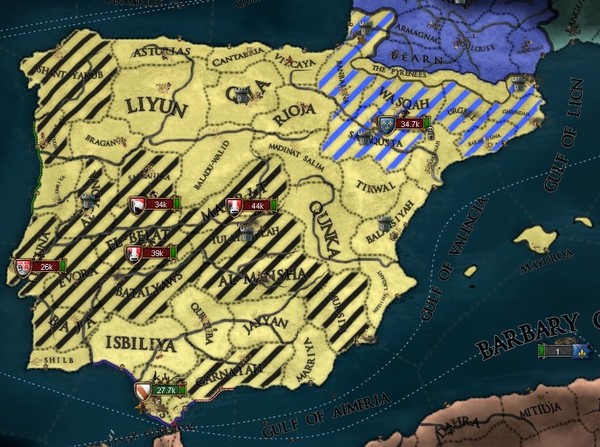
This led to Gamila’s enraged supporters breaking away from the Majlis’ cause, instead rebelling against them. Salma Hisham quickly took control of the army and marched against the defectors, crushing them in pitched battle.
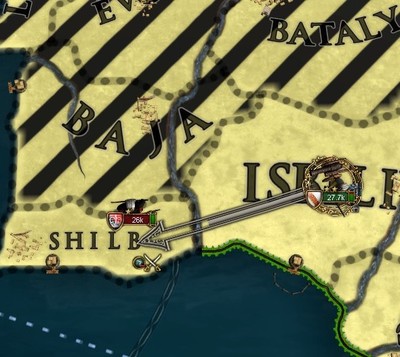
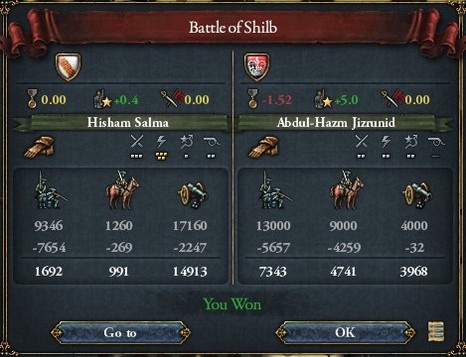
Whilst Salma was fighting Ali’s supporters, however, another Tariqi army descended on Qadis. The Majlis managed to mobilise the city’s populace against the besiegers, fortunately, coordinating a massive peasant revolt against the Tariqi forces.
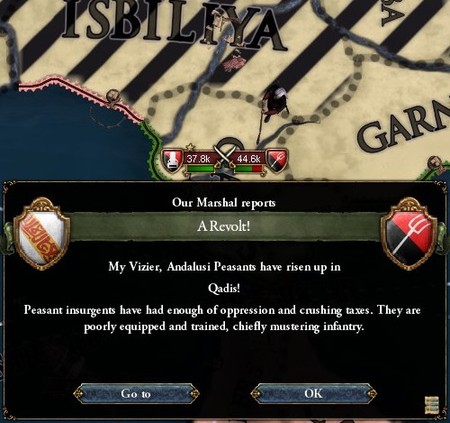
The rebellion was eventually crushed, of course, but only after a massive battle and the slaughter of thousands. The Tariqi army was left incredibly weakened, allowing the French army to swoop in from nowhere and annihilate what was left of it.
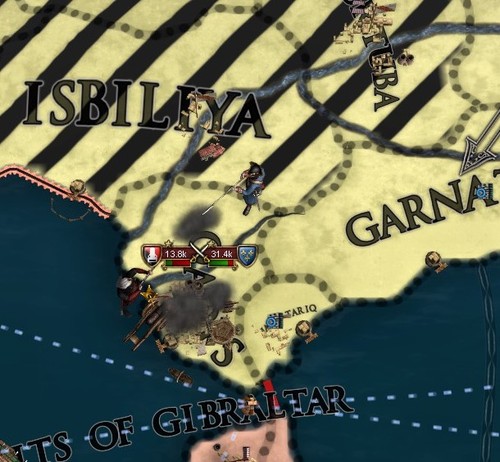
This weakened the French just enough that Salma Hisham felt confident enough to attack, engaging the French invaders below the walls of Qadis.
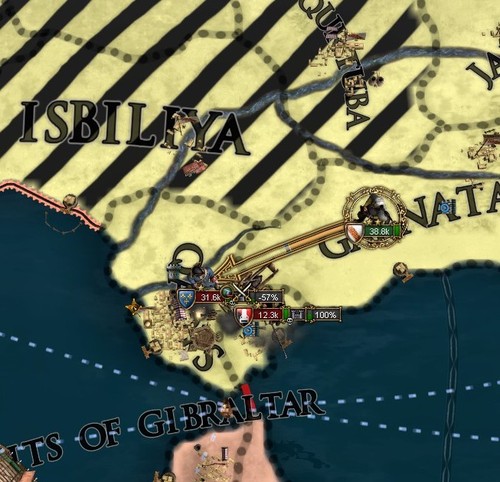
The battle raged uninterrupted for the entire day, and despite inferior morale, Andalusi discipline combined with Salma’s penchant for tactics allowed them to stand their ground.
The battle ended with the Andalusi scoring a much-needed victory and the French forced to withdraw, leaving almost 15,000 dead below the well-fortified parapets of Qadis.
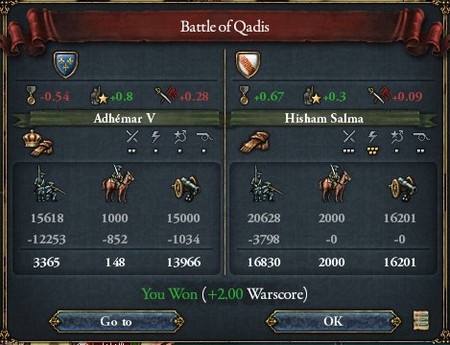
As the entire city breathed a sigh of relief, however, disastrous news arrived from the north. Having secured control of all Portugal for years now, the separatists were finally able to declare their complete and unfettered independence, crowning the local prince Coenric as King of Portugal.
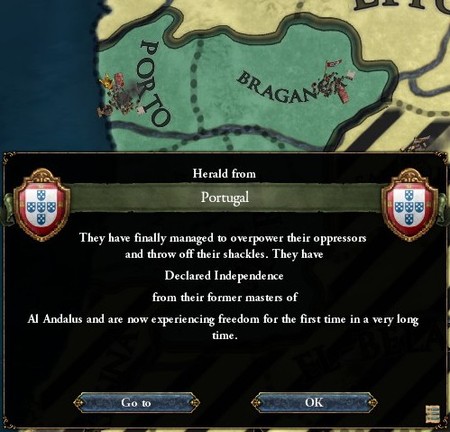
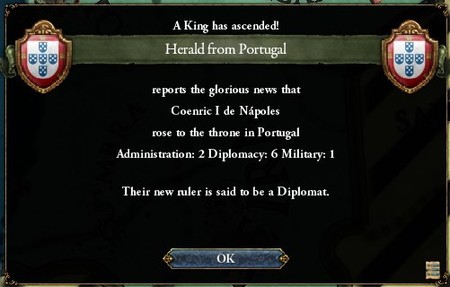
And the Majlis could do absolutely nothing. The army was shattered and half of Iberia still under occupation, with more revolts and rebellions on the way, not to mention the looming threat of war with Morocco.
As if to prove a point, more separatists rose up in Navarra and Aragon, seeking to emulate the Portuguese and seize their own independence. In a fortunate twist of fate, however, another French army was just descending from the Pyrenees, crushing the rebels as they did so.
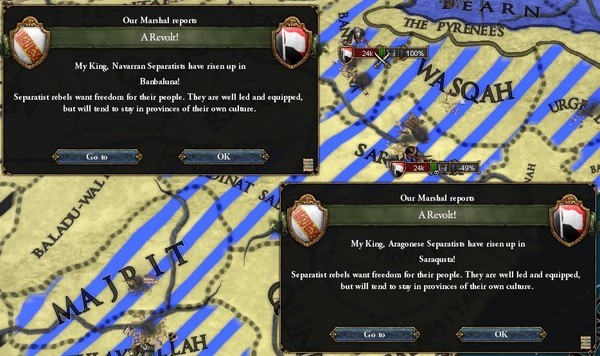
More uprisings broke out over the next few months, including noble and particularist rebels, and the Majlis was forced to borrow increasingly-large amounts of money, this time from Provencal lenders.
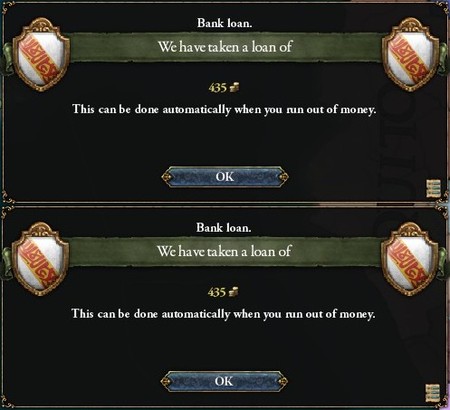
Salma Hisham then led the army northward to begin suppressing these revolts, only for his entire force to be pinned down by another French army, determined to avenge their previous defeat.
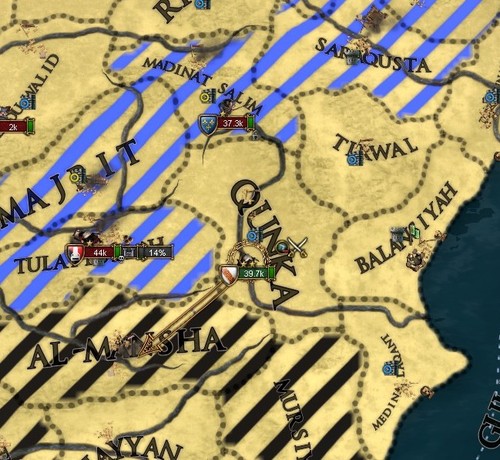
And vengeance they got. The early hours of the battle was a hotly-contested feud, but the French quickly managed to seize the upper hand, repelling Salma’s feeble incursions and counter-attacking with force.
The day ended with a decisive French victory, and half the Andalusi army gone to the mud.
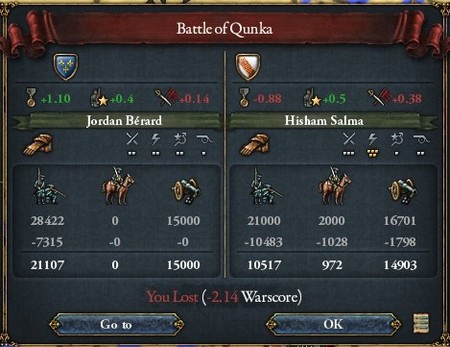
This was the final straw, and the Majlis was forced to sue for peace. King Dávi demanded nothing less than the return of all French territories lost during the last war, as well as the Balearic Islands and massive war indemnities.
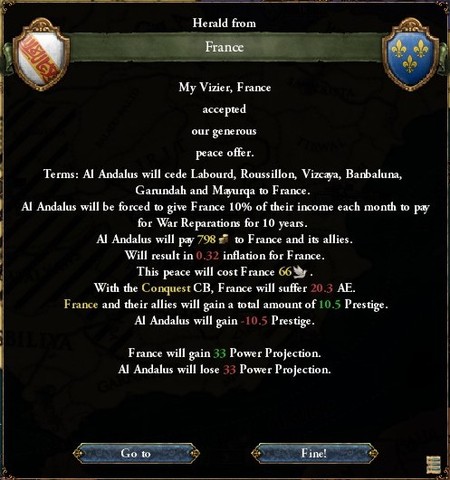
Even before the treaties were signed, riders arrived in Qadis informing the Majlis that Tulaytullah had fallen yet again, with the Tariqi pretenders capturing the city.
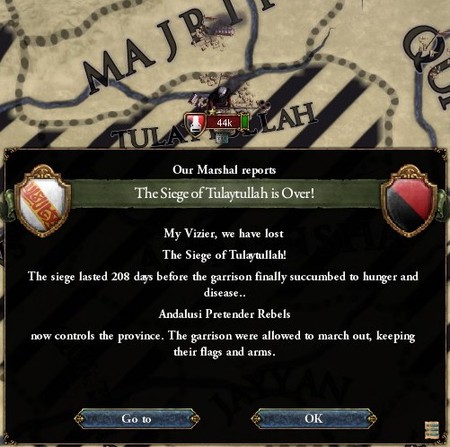
The immediate future of Al Andalus was daunting to behold. Not only was the army destroyed and manpower reserves long tapped out, but the Majlis was steeped in severe debt to countless moneylenders…
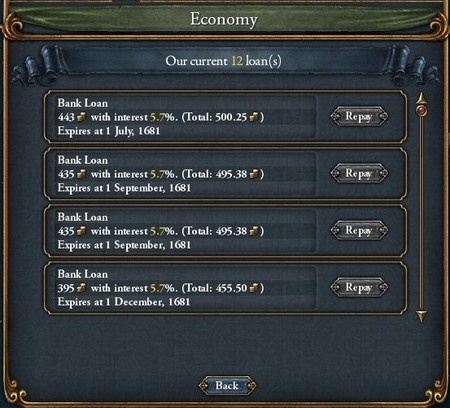
And the ungodly interest on these loans led to a stark rise in inflation, making the Andalusi dinar almost worthless.
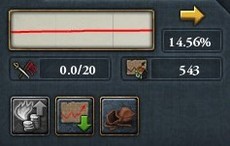
To add to that, the Muqti of Juzur Qarbiya was surely on the verge of declaring war, backed by his powerful supporters in the Almoravid Sultanate.
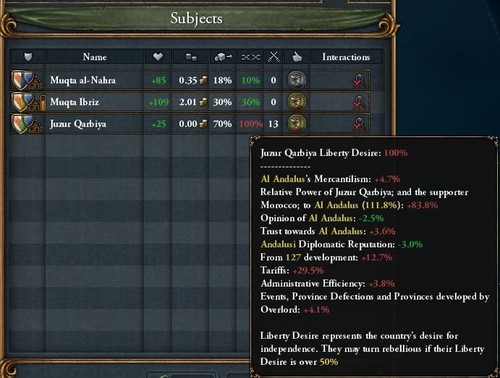
Salma Hisham led the forces of the Majlis – now made up almost entirely of foreign mercenaries – towards Granada, the stronghold of the Tariqi rebellion. The rebels retaliated by besieging Qadis yet again, however, forcing Salma Hisham to prepare for another battle to relieve the capital.
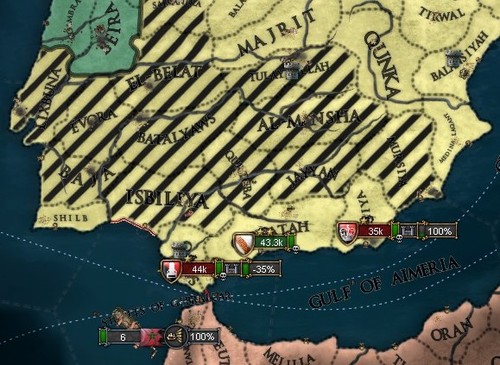
Just days before the two armies were set to clash, however, envoys arrived from the Tariqi camp...
Al-Muhsin – the Tariqi pretender himself – offered to lay down his arms and help bring some much-needed peace back to the peninsula, bringing the Fitna of al-Andalus to an end. In return, however, he demanded that he be named as the new Sultan of Al Andalus, with the infant Ismail deposed as the son of a tyrant and traitor.
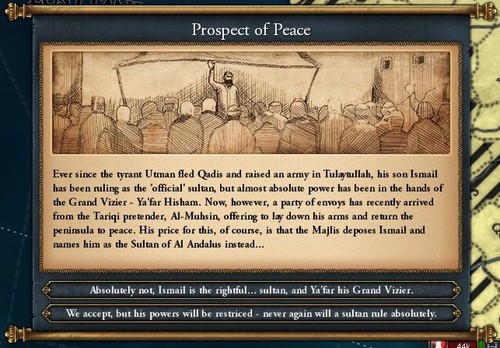
With this, the Majlis is faced with another important choice – accept the offer, and name Al-Muhsin as the new sultan – or refuse him, leaving the Grand Vizier in control of the sultanate. Both choices are sure to have dire consequences for Andalusia and Iberia…
World map:
